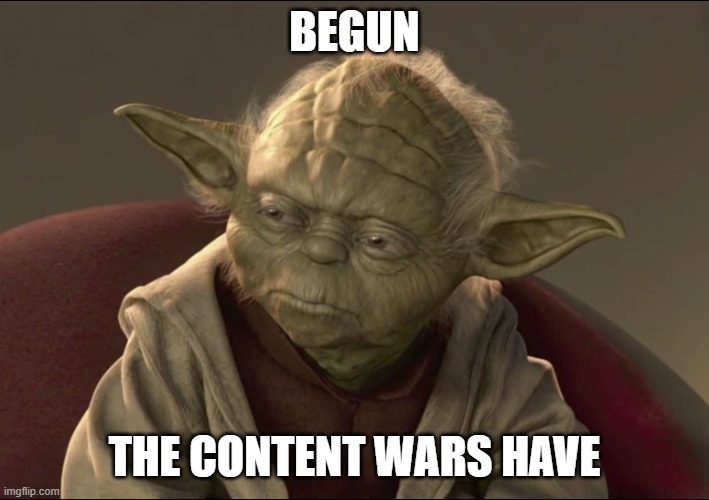AI content is here.
This comes in the guise of ChatGPT and a number of more niche content-generation tools.
ChatGPT and AI content has been covered before so I won’t go into too much detail on what it is or why you should care but if you are unsure, read up as change is coming.
What I will talk about is how I feel this will impact the SEO and content marketing world. In particular, should you use generative AI to create content for your website? Is this urgent? Do you need to be at DefCon(tent) #1, or can you be a little more relaxed and see how this plays out?
What is clear is that the rate of change is accelerating and to have any chance of making the right decisions going forward we have to be mindful of the past.
AI PaNiC
If you have shown even a passing interest in AI or marketing, then odds are you are under siege from ads for ChatGPT prompts.
Social media is seemingly awash with gurus promising to unlock this transformative new technology and transform your business.
Yet, despite this sudden surge in interest, forms of AI have been around for 25 years or more and a chess AI beat the world chess champion in 1997. Within the search and digital marketing space, Google Ads has used AI for over 10 years and Performance Max Campaigns are almost entirely AI-driven.
So whilst interest in AI may have suddenly taken off with ChatGPT, AI itself is not new.
1.1. Search volume for “AI” over the last 12 months from Google Trends

ChatGPT itself had a huge launch with over a million users a few weeks after launch (making it the fastest-growing consumer product ever).
So AI and AI content has most definitely arrived.
What is AI Content?
ChatGPT is a tool driven by AI technology that allows you to ask questions, get responses, and have a continued conversation-like interaction.
Using the tool is simple as it mimics a chatbot-like interface (which puts the “chat” in ChatGPT).
And I have to admit, even with my fairly cautious approach to new shiny marketing toys, that ChatGPT and many of the other AI content tools really are very powerful.
From a content perspective, you can easily generate everything from ideas to the actual content itself.
You can expand an idea, summarise content, expand content, add references, specify tone, reading level, structure, style and much more.
Working on a website project this week our copy was too long for some elements so we were able to input our copy and shortened output – in seconds. Instead of going back to the copy team, we were able to get this 90% revised whilst on a call with the customer and the web guys.
Ultimately, AI tools make it easy to generate any form of written content (along with images and video).
ChatGPT and SEO
So, AI tools like ChatGPT can generate content for you.
So, it naturally follows that in a content-driven SEO landscape, the SEO community has wasted no time using ChatGPT to scale content production.
Want more blog posts? Content for your service pages? Page titles? Meta descriptions? A lot of the old-school nuts and bolts SEO content tasks to build and optimise websites just got a truckload easier.
This is all good and well and undeniably has utility for you and the 400 million other SMEs competing for eyeballs.
But there is an obvious problem here.
If the SEO world has made a mistake over the years it would be summarised as – more is not better. More links, more content, more pages – more penalties.
Even before AI content, the web was already littered with boorish, undifferentiated content that offers little you can’t find elsewhere.
Sure, Google has quite rightly clarified and revised policies with regard to AI content to allow anything as long as it is truly useful. The fact is that the majority of SEO content created with AI will be generic and bring little new to the table.
Most AI content will be trash – and it is not the AI’s fault, rather, this is something known as GIGO: garbage in, garbage out.
Low effort and poor-quality input produce low-quality output.
Humans are hard-wired to pick the path of least resistance (1). Where we have tools like ChatGPT that will provide reams of output with very little input, then the majority will take the easy option.
If I had to take a guess, I would assume that not only will the input and output be poor in most AI content published, I doubt it will even be read by the person creating the content.
So, my guess, based on what I have seen over the years, is that most of the content created in the AI content gold rush will be generic.
So, quite rightly, the content will be ignored by Google and the intended audience.
Quality is needed, not just quantity.
More is not always better.
Begun, The Content Wars Have

Back in 2008, Eric Schmidt described the Internet as a cesspool.
This was before AI content, and tools like ChatGPT just accelerated content output from 0 to 100 overnight.
Yet, we are seeing this not only online but also in meetings with credible brands, who feel like they are on the backfoot with AI, taking advice from self-anointed AI gurus.
I was recently in a marketing meeting with AI consultants advising rapid content generation and posting of several automated posts per day.
We have also reviewed tools that will automatically generate and publish several blog posts a day to your site for less than $1 an article. We have even been approached by the owners of one of these SEO tools that make big SEO promises for SEO advice (go figure).
Even with a human-led campaign inspired by keywords generated from SEO tools, most content published online was already pointless and poor.
Worse, now things are.
Now, we have the potential for a never-ending stream of generic, generated content. Sure, some of this may be better than low-quality outsourced content but how much of it will offer anything truly unique or useful? How much will offer any real value?
The internet, once a cesspool, is now becoming a meh-pool.
99.9% of everything generated and published by AI is just going to offer little unique value.
In response to this, Google will turn the ignore dial-up to 11.

This Has All Happened Before
There is very little new here for those of us in the SEO game for a while now.
Google has not just started fighting back against web spam and the Florida update dropped 20 years ago in 2003. Panda and Penguin followed. Now, as ever, the focus is quite rightly on promoting quality rather than the punitive updates of old.
Just the most cursory glance at SEO history through Google’s algorithm updates tells us that Google will clamp down on generic automated content in just the same way. In fact, they have already started to do so and will only continue to refine the approach further.
All You Can E-E-A-T Content
Fortunately, there is another way to look at this.
AI content tools make it easy to crank out content.
The majority of the content pumped out will be generic and ignored.
This creates an opportunity for unique, helpful content based on real-world experience.
Fortunately, Google tells us what we need to aim at with E-E-A-T.
- Experience
- Expertise
- Authoritativeness
- Trustworthiness
These are all things that you, as a human person, doing what you do, have in spades.
These are all things that ChatGPT or other AI tools can never have directly.
Sure, E-E-A-T is not a ranking factor per se, but E-E-A-T is what Google is aiming at, so it is what you, as a helpful human author, should also be aiming for.
The real opportunity is you.
Your expertise and your experience.
You are a trusted authority in what you do in a way that generative AI can never be.
Helpful Content
Beyond E-E-A-T, Google has recently been talking about what is known as the “helpful content update”.
The stated goal of this update is to:
“Ensure people see more original, helpful content written by people, for people, in search results”.
Let’s tease that apart a little:
- Original
- Helpful
- Written by people
- For people
You don’t have to read too hard between the lines to see what is being said here.
There is even a series of questions that can help you ensure you are focusing on “people first content” and again, a few really stand out:
- Does your content clearly demonstrate first-hand expertise and a depth of knowledge (for example, expertise that comes from having actually used a product or service or visiting a place)?
- Are you using extensive automation to produce content on many topics?
- Are you mainly summarizing what others have to say without adding much value?
There are several others, so I won’t recreate them here, but the small snapshot above gives you an idea of what they are shooting for.
Lessons from Good Will Hunting
I don’t want you to get me wrong here – ChatGPT and AI tools are truly amazing. This is the first real step towards something entirely new, and they will change things.
I don’t have a crystal ball, but it feels like AI will change things in the same way that the internet, search engines, and social media have – it will be big.
It is hard to accurately predict where this will go. Remember, science fiction has made some great predictions over the years, but nobody saw mobile phones coming!
Similarly, I don’t think any can predict where this will take us with any real accuracy.
This is just the first step.
All of this reminds me of a scene in one of my favourite movies – Good Will Hunting.

Will Hunting (Matt Damon) is a seriously troubled orphan with a genius-level IQ.
Will works at MIT as a lowly janitor and, just for kicks, solves a complex math problem left on a board as a challenge to students. This problem is of a magnitude that only a handful of people in the world can solve it.
The maths professor finds the solution and initially assumes it was a student. Still, eventually, after leaving a more complex puzzle, he catches Will in the act of solving the problem and starts to work with him.
Unfortunately, Will is jailed for an assault and fails to convince the judge to drop the case. The professor manages to get Will leniency, but only if he sees a therapist.
The problem is that Will is too cocky, and most therapists will not work with him, that is, until he meets his match, Sean Maguire (Robin Williams).
In their first meeting, Will critiques a painting and inadvertently insults Sean’s deceased wife.
As with the other therapists, Will found a weakness and exploited it to get his own way.
This is more than Sean can take, and he almost ends their engagement on day one.
However, after a sleepless night, Sean has an epiphany.
Will is just a kid.
He is a genius, no doubt about that.
But he has no experience of life at all.
He knows everything about everything, but it is all from books.
Will has never lived. He has never loved. He has never experienced true loss. He has no actual, lived experience of anything – it is all just book smarts.
And guess what.
AI is just a kid.
It does not have the faintest idea of what it is talking about.
It can tell you all the facts in the world.
But it has no real-life experience.
Therefore, the opportunity here is still what it has always been.
Create something unique, truly-helpful, based on your unique experience and expertise.
Create something that helps the people that you can help.
Something that shows you are an expert authority who can be trusted to help others achieve their goals.
Something that shows your knowledge and experience.
This is what Google is looking for with E-E-A-T.
Experience, Expertise, Authority & Trust.
This kind of content promotes you in a way that demonstrates your credibility and experience and makes your content attractive to the search algorithm.
ChatGPT or any AI Content tool can’t do that – but you can.
AI or IA? How to Use These Tools
There is a more practical way to think about AI tools.
This is less of a “will do it for you” mentality and more of a “help you do it” approach.
AI – Artificial Intelligence?
OR
IA – Intelligent Assistant?
At Bowler Hat, we believe that AI is an intelligent assistant. Something that can help us do our jobs but that won’t do it as well as a human who is using these tools effectively.
Ultimately, the best output from AI tools requires creative human input!
The Real Content Opportunity in the Age of AI
There is always an opportunity when change comes, but it is often not what it may seem.
On the surface, the opportunity would seem to be this path-of-least-resistance content generation using AI tools.
Most businesses will do that, and some predictions suggest that AI will generate up to 90% of content online by 2026 (2).
So don’t do that.
The real opportunity is to target the quality gap created by AI content’s unquestioning adoption and mass publication.
Do this by becoming a content cyborg.
Create content that is built upon your real-world experience and expertise.
Use AI content tools as an intelligent assistant to help you build something better than either you or AI could do alone.
Aim your content directly at your customer’s needs and orient it with E-E-A-T: Experience, Expertise, Authority & Trust.
So use AI, but don’t take the path of least resistance – use it wisely to create something completely new that combines the best of the human and AI worlds.
The real opportunity here is to create something better.
Something that represents the perfect intersection of your knowledge and the generative powers of AI.
Aim at better and your SEO will thank you.
Written by a human – not AI.
Good Will Hunting Clip – You’re Just a Kid
https://www.youtube.com/watch?v=dEIQSbul9Os
References






